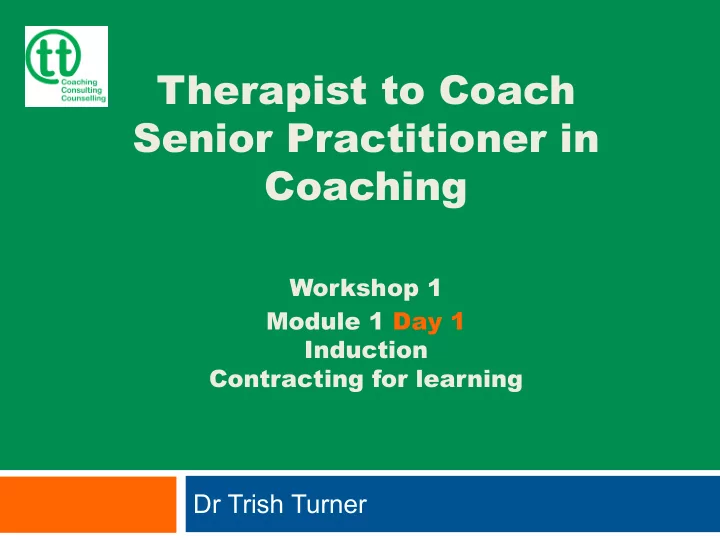

Therapist to Coach Senior Practitioner in Coaching Workshop 1 Module 1 Day 1 Induction Contracting for learning Dr Trish Turner
Agenda – Day One 10.00 Contracting for learning 11.15 Break 11.30 Competence exercise 12.15 Reflective practice 1.00 Lunch 2.00 Reflective practice 3.15 Coaching definitions, boundaries and skills 3.30 Break 3.45 Coaching definitions, boundaries and skills 5.00 Checking out 5.30 Finish
Contracting for working together (p12) ¨ Principles High quality ¨ Our commitment to each other Mutual Flexibility respect ¨ Questions/additions? Being fair Fully Open to Being engage challenge prompt Constructive feedback Clear communication
Introductions - exercise ¨ Choose a card – you becoming a coach ¨ Stick on flipchart with name Whole group ¨ Share: ¤ Why picked card ¤ Theoretical orientation ¤ One thing to bring ¤ One thing to learn
Aims and objectives (p11) ¨ Values, beliefs, self awareness ¨ Reflective practice, skills and theory ¨ Complex, ethical contracting ¨ Effective coaching relationship ¨ Client’s state of being ¨ Outcome and action orientation ¨ Tools and techniques ¨ Evaluation ¨ Boundaries and Integration ¨ Links to EMCC competences and capability indicators
Competences EMCC Different levels ¨ Foundation/practitio ner – entry to T2C programme ¨ Senior practitioner ¨ Competences and capability indicators (Appendix E)
Working break
Competence exercise ¨ Using scaling ¨ 0 – 10 ¨ Where 10 is you In dyads or completely meet this triads competence and 0 Then discuss is the opposite of as a group (45 mins) that. Handout 1 ¨
Reflective practice portfolio The purpose: ¨ Enhance your self-awareness ¨ Be curious about your learning ¨ Practise as a coach ¨ Reflect on your learning ¨ Record feedback and assessment ¨ Evidence your practice ¨ Evaluation your practice
Portfolio sections ¨ Introduction ¨ Section 1 – self reflection & assessment ¨ Section 2 – client work ¨ Section 3 – theory into practice ¨ Section 4 – supervision ¨ Section 5 – submission ¨ Submission date – 2 July 2020
Self reflection & assessment ¨ Personal objectives for the programme ¨ Workshop preparation and review form – before and after each workshop (4) ¨ Reflective journal – after each workshop (3)
Client work ¨ Log of coaching hours ¨ Four forms per coaching session Meeting report form 1. Self-evaluation form 2. Feedback form 3. Feedback and practice reflection form 4. ¨ Overall summary practice reflection template ¨ Coachee learning outcomes questionnaire ¨ Co-coaching – finding a ‘buddy’
Theory into practice ¨ Reflective assignment – therapist to coach “competence” ¨ Case studies (showing development) ¨ Theory assignment – strengths and limitations ¨ Log of reading
Supervision ¨ Coach supervision log ¨ Co-supervision – find another ‘buddy’ (6) ¨ Professional supervision (2) ¨ Supervision reflection and review form (8) ¨ Personal development plan ¨ Tutorials (2) Supervisor – Katherine Long
Submission process ¨ Checklist – all elements of portfolio ¨ 2 July 2020 ¨ One electronic copy (two hard copies) ¨ Marked ¨ Quality assured ¨ Notification – “EMCC Senior Practitioner in Coaching” ¨ International recognition
Accreditation (EIA) ¨ EQA – qualification ¨ EIA (European Individual Accreditation) ¨ Formally recognises prior learning and experience, reflective practice logs, CPD, supervision ¨ I validate this for you – fee to EMCC for assessing and your membership (£360) ¨ International recognition ¨ Renew every 5 years
Resources
Learning process
Plenary ¨ What are your thoughts and feelings so far? ¨ What are the questions coming up for you?
What is coaching? Exercise ¨ Definitions? ¨ Skills? 5 mins to remind self of ¨ Way of being? definitions. ¨ Values? Discuss in pair/triad ¨ Audience? ¨ Type of coaching? Share thoughts in group
Contracting and boundaries - exercise 23 ¨ How are they the same? ¨ How are they Coaching different? Mentoring Counselling
Break – 3.30pm
Spectrum of coaching skills - exercise ¨ Arrange the cards into a linear order, from directive to non-directive Whole ¨ Explain and debate group your choices until you reach consensus
Coaching skills spectrum Non-directive Pull Listening to understand Helping Reflecting someone Paraphrasing solve their Summarising own problems Asking questions to raise awareness Making suggestions Giving feedback Offering guidance Giving advice Instructing Push Directive Solving someone’s problems for them
What kind of coach? ¨ As you start out and looking to the future, Discuss in what kind of coach dyads/triads do you think you would want to be? Brief sharing in the whole group ¨ Ref (types of coaching p 21)
Checking out ¨ One word - how do you feel ¨ One thing - you are taking away from today ¨ One thing - you are doing tonight?
Recommend
More recommend